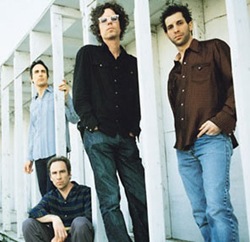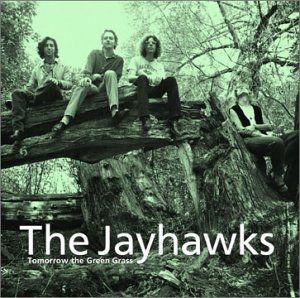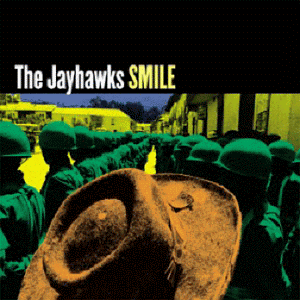 FOREWORD: At Maxwells in Hoboken (while my wife, Karen, ate hummus), I got to chat with Jayhawks main man, Gary Louris, prior to an enthusiastic set promoting ‘00’s demure Smile. One of the leading lights of the ‘90s alt-Country scene, Louris returned to the stripped down approach of earlier Jayhawks albums on ‘03s Rainy Day Music. Though his duo project with former Jayhawks partner, Marc Olson, Ready For The Flood, was subpar, Louris’ becalmed solo chestnut, Vagabonds, also released in ’08, proved to be highly inviting. And it was recorded in Laurel Canyon, the ‘70s singer-songwriter refuge for superstar troubadours such as James Taylor, Carole King, Joni Mitchell, and Crosby Stills Nash & Young. This article originally appeared in Aquarian Weekly.
FOREWORD: At Maxwells in Hoboken (while my wife, Karen, ate hummus), I got to chat with Jayhawks main man, Gary Louris, prior to an enthusiastic set promoting ‘00’s demure Smile. One of the leading lights of the ‘90s alt-Country scene, Louris returned to the stripped down approach of earlier Jayhawks albums on ‘03s Rainy Day Music. Though his duo project with former Jayhawks partner, Marc Olson, Ready For The Flood, was subpar, Louris’ becalmed solo chestnut, Vagabonds, also released in ’08, proved to be highly inviting. And it was recorded in Laurel Canyon, the ‘70s singer-songwriter refuge for superstar troubadours such as James Taylor, Carole King, Joni Mitchell, and Crosby Stills Nash & Young. This article originally appeared in Aquarian Weekly.
Along with the now defunct Uncle Tupelo (which splintered into Wilco and Son Volt), the Jayhawks were underground country-pop icons during the early ‘90s No Depression era. After ‘89s formative Blue Earth gained critical attention, their ‘92 classic Hollywood Town Hall refined lessons learned from influential country-rock legends Buffalo Springfield and the Flying Burrito Brothers while delving further into authentic, roots-based country-folk (best demonstrated by the timeless opener “Waiting For The Sun”).
Since co-founder Mark Olson left the Minneapolis combo after ‘95s well-received Tomorrow the Green Grass to marry singer/ songwriter Victoria Williams and live in the Arizona desert, vocalist/ guitarist Gary Louris has taken on the bulk of responsibilities. The re-configured Jayhawks (including bassist Marc Perlman, drummer Tim O’Reagan, guitarist Kraig Johnson, and organist Jen Gunderman) stretched into orchestral pop and sonic rock on ‘97s somber Sound Of Lies (which suffered from underexposure due to record label woes).
Without sacrificing their roots-y approach or leaving behind the deeply felt sadness of earlier works, the newly waxed and sarcastically titled Smile seeks instant pop accessibility.
The earnest love vow, “I’m Gonna Make You Love Me,” takes on the mainstream, balancing sweet, uplifting harmonies and rural mandolin earthiness with surging rock guitar energy. Low key ballads such as the tear-stained “Better Days,” the solemn, pedal steel injected Karen Grotberg – Gary Louris duet “A Break In The Clouds,” and the neo-Classical title cut counter blustery, feedback scorchers such as the implosive “Somewhere In Ohio,” the sturm and drang “Life Floats By,” and the wah wah-stricken “Pretty Thing.” Veteran producer Bob Ezrin (Alice Cooper/ Kiss/ Lou Reed) helped give Smile necessary guidance and direction.
How does Smile differ from Sound Of Lies?
GARY LOURIS: There’s a different emphasis. This album is more polished and thought-out. Two years ago, we went in the studio purposely unprepared just to see what would happen spontaneously. Good things came out of that. But there were some things I wish I spent more time on. We spent more time preparing, planning, arranging, and writing the new album.
“Life Floats By” and “Pretty Thing” go for a sonic rock bluster reminiscent of Neil Young and Crazy Horse. Are they a profound departure from your country-rooted auspices?
Growing up in the ‘60s and ‘70s, I listened to a lot of rock and roll on the radio. That’s the way it has been with the Jayhawks. It’s just that we had a different treatment. We like to play guitar and rock out. Most of what you hear on the new album has always been with us. It’s only coming out at this particular point.
How did Ed Ackerson’s mixing skills and Bob Ezrin’s production make Smile unique?
Ed is an interesting character who bridges the gap between Woody Guthrie and the Byrds and Stereolab and the Chemical Brothers with his band Polara. He listens and plays a lot of different music. He was respectful of our past, but was interested in experimenting. Bob likes to be a little mischievous and surprise people. He focused us and pushed us and told us to loosen up.
Do your country roots extend beyond Gram Parsons and his ilk to traditionalist forefathers George Jones, Hank Williams, and Lefty Frizzell?
When Mark Olson and I started the band, we listened to a lot of Dylan, Louvin Brothers, Merle Haggard, George Jones, and Porter Wagoner, plus weird ones like Tommy Collins. The bands Mark and I were in before the Jayhawks were rockabilly. They got us to listen to a lot of Americana and traditional music. At the time, we felt no one else was doing it and we were in a town that had Husker Du, the Replacements, and Soul Asylum. We wanted to find our own niche. So we fell into it.
Why didn’t country radio accept the Jayhawks, Uncle Tupelo, and the Bloodshot bands in the early ‘90s?
It’s very conservative. I don’t think we were a real country band like Merle Haggard’s Strangers or Buck Owens’ band. It’s really hard to play straight country. You have to have a really great country voice, which I don’t think we had. We put our own stamp on it. Country radio, by that time, was moving into a dull period and we never expected to get anywhere. We were a little too in between. We were traditional, yet non-purists, at the same time.
Did you mind getting lumped in as an “alt-country” band?
It was a mixed blessing. You have people who feel they’ve got you in a certain box. They don’t want you to change. After the last two or three records, we cleared the boards and said we’re flexible. We want to try different things. We may have alienated some people.
A major stylistic turnabout had to be “Somewhere In Ohio,” a song that seems to hearken back to your days living there. It has a syncopated dance beat and blustery guitar feedback.
Actually, Marc Perlman started writing a three-chord song with that drumbeat going. We had a drawing in our practice space that said “Somewhere In Ohio.” So Bob said, “You’ve got to make a modern folk song out of it.” Then we all got involved.
Many new songs rely on beautiful multi-harmonies.
When Mark Olson left, it changed the band. We didn’t want someone to step in and pretend Mark was never there. We didn’t want to show disrespect to Mark. So then we got Karen Grotberg involved, which gave the songs a whole different dynamic having a woman’s voice. Tim joined the band after the recording of Green Grass. So now we have three fine singers. We decided to do more creative vocal arrangements with this album. Plus, we were working on borrowed time since Karen was pregnant and it was hard for her to breathe. We had to go in short stints.
-John Fortunato